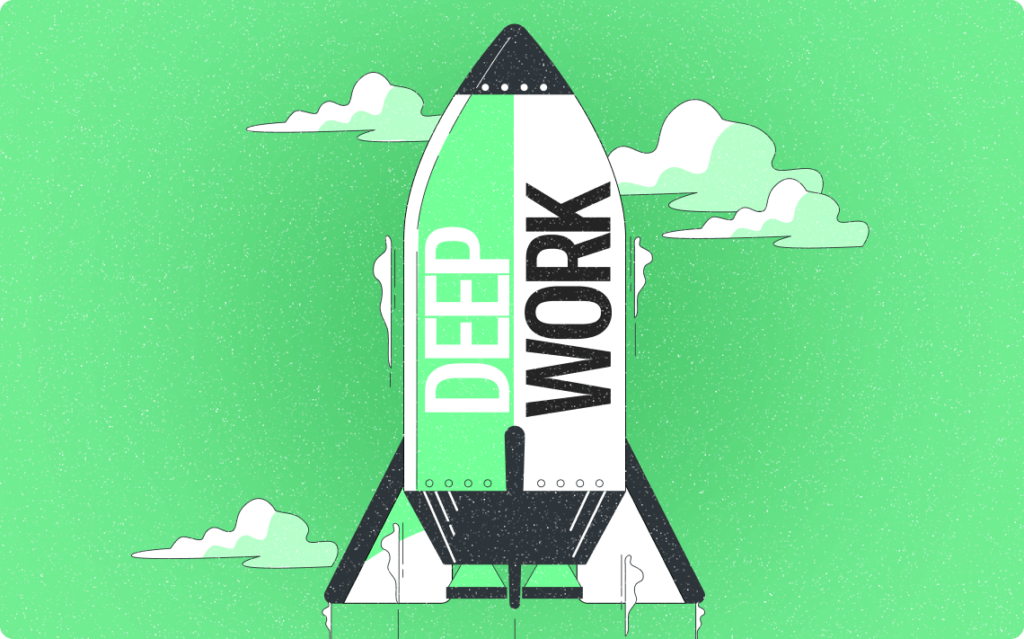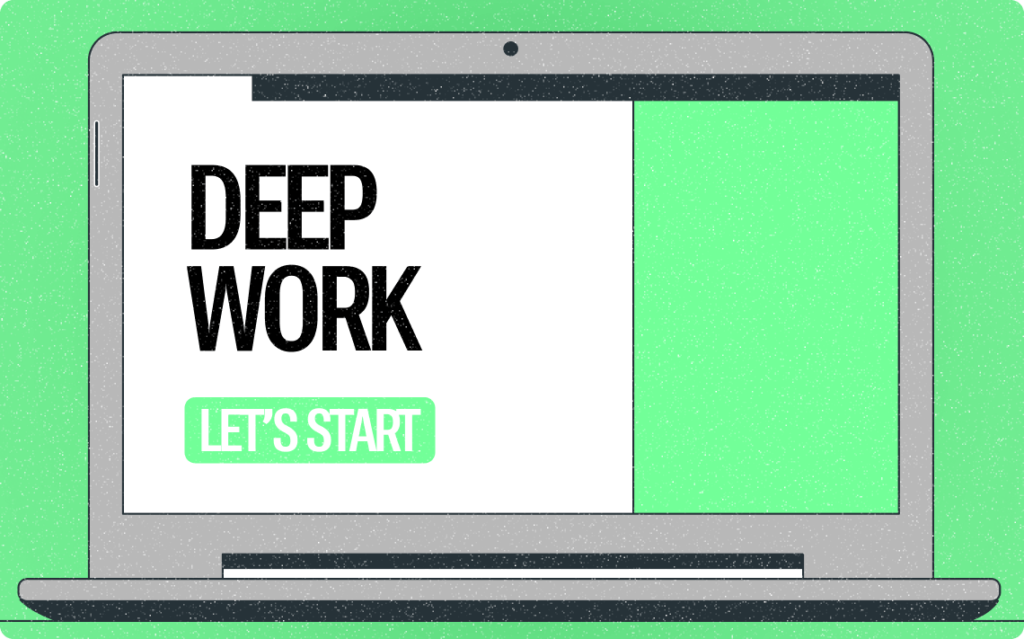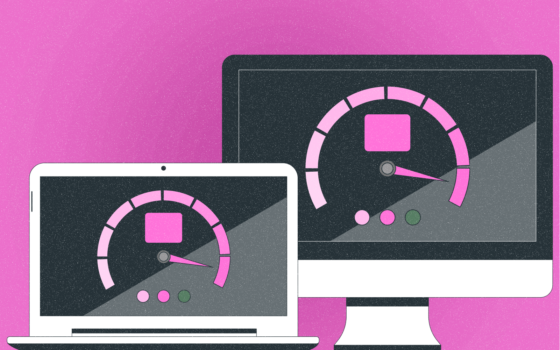What Is Deep Work? Understanding the Concept and Its Impact

In an increasingly distracted world, the ability to focus intensely on cognitively demanding tasks has become a rare and valuable skill. The concept of deep work, popularized by productivity expert Cal Newport, highlights the importance of dedicating uninterrupted time to tasks that push our cognitive abilities to their limits. Unlike shallow work, which is often characterized by low-value, superficial tasks, deep work enables individuals to produce high-quality work, solve complex problems, and achieve meaningful progress in their professional and personal lives. This article explores what deep work is, why it is so important, and how you can incorporate it into your daily routine.
What Is Deep Work?
Deep work is the act of focusing without distraction on a cognitively demanding task. It involves immersing oneself fully in the task at hand, allowing for maximum concentration and creativity. According to Cal Newport, deep work is a state where an individual can produce their best work, often leading to breakthrough ideas and exceptional results.
Deep work requires uninterrupted blocks of time, during which an individual can work without distractions. These periods of focused effort allow the brain to operate at its highest level, leading to the generation of high-quality outputs. Deep work is not just about working longer hours but about working smarter—maximizing the quality and impact of the work done in a given time.
Deep Work vs. Shallow Work
To better understand deep work, it is essential to distinguish it from shallow work. Shallow work refers to tasks that are non-cognitively demanding and often performed while distracted. These tasks include answering emails, attending meetings, or scrolling through social media—activities that require little brainpower and can be easily replicated by others.
Shallow work is typically necessary but does not contribute significantly to professional growth or personal satisfaction. In contrast, deep work tasks are those that challenge the brain, require creativity, problem-solving, and lead to substantial progress toward one’s goals. While shallow work is often urgent and feels productive, deep work is where real value and innovation are created.

Why Is Deep Work So Important?
In today’s knowledge-driven economy, the ability to perform deep work is increasingly becoming a key differentiator between those who thrive and those who merely survive. The modern workplace is filled with distractions—emails, social media, open-plan offices, and endless meetings—that can fragment attention and reduce productivity. As a result, the ability to engage in deep work is becoming a rare and valuable skill.
Deep work is important because it allows individuals to produce work of higher quality and greater value in less time. It enables workers to solve complex problems, develop new ideas, and contribute meaningfully to their fields. Additionally, deep work is critical for personal and professional development, as it encourages continuous learning and mastery of skills.
In a world where shallow work dominates, those who can consistently perform deep work will stand out. They will be the ones who drive innovation, achieve their goals, and experience a greater sense of fulfillment in their careers. The importance of deep work lies not only in its ability to produce tangible results but also in its power to transform how individuals approach their work and lives.
Get more out of your business
Get the best employee engagement content every week via mailing list

The Benefits of Deep Work
The practice of deep work offers a myriad of benefits that extend beyond mere productivity. It fosters an environment where creativity flourishes, skills are honed, and a sense of accomplishment is achieved. Here are some of the most significant benefits of deep work:
1. Unparalleled Focus
One of the most immediate benefits of deep work is the ability to concentrate intensely on a single task. In an age where multitasking is often seen as a virtue, deep work emphasizes the power of focus. By dedicating uninterrupted time to a specific task, you can immerse yourself fully in your work, leading to greater efficiency and higher-quality results.
This focus also reduces the cognitive load associated with constantly switching between tasks, known as context switching, which can significantly impair productivity. When you engage in deep work, you allow your brain to remain in a state of flow, where it operates most effectively and creatively.
2. Enhanced Employability
In a competitive job market, the ability to perform deep work can set you apart from your peers. Employers highly value individuals who can produce exceptional work, solve complex problems, and drive innovation—all outcomes associated with deep work. As shallow work tasks become increasingly automated or outsourced, the demand for individuals who can engage in deep, meaningful work will only grow.
Deep work cultivates expertise and mastery, both of which are critical in today’s knowledge economy. By consistently practicing deep work, you develop skills that are difficult to replicate and therefore become indispensable to your organization. This enhanced employability ensures that you remain relevant and valuable in your career, regardless of industry changes or technological advancements.
3. Better Job Satisfaction
Deep work not only boosts productivity and employability but also contributes to greater job satisfaction. When you engage in deep work, you are more likely to produce high-quality results that align with your professional goals and values. This sense of accomplishment and purpose can lead to increased job satisfaction, as you see the direct impact of your efforts.
Moreover, deep work allows you to focus on tasks that are truly meaningful, rather than getting bogged down by trivial, shallow work. This alignment between your work and your values leads to a more fulfilling and satisfying career, where you are continually challenged and motivated to grow.
4. An Improved Sense of Self
The practice of deep work has profound effects on one’s sense of self. As you engage in tasks that challenge and push your cognitive abilities, you develop a stronger sense of identity and purpose. Deep work encourages self-discipline, resilience, and the pursuit of excellence—traits that contribute to a more confident and empowered self.
By focusing on meaningful work, you also become more aware of your strengths, weaknesses, and passions. This self-awareness fosters personal growth and a deeper understanding of what truly matters to you, both professionally and personally. As a result, deep work not only enhances your productivity but also enriches your overall sense of well-being and fulfillment.

Getting Started with Deep Work
Incorporating deep work into your daily routine requires intention, discipline, and a willingness to make changes to your current work habits. Here are five steps to help you get started with deep work:
Step 1: Identify Your Deep Work Tasks
The first step in embracing deep work is to identify which tasks in your workday qualify as deep work. These are the tasks that require your full attention, creativity, and cognitive abilities—tasks that, when completed, will have a significant impact on your goals. Examples might include writing a report, designing a complex project, or learning a new skill.
Once you’ve identified these tasks, make them a priority in your schedule. Recognize that not all tasks require deep work; shallow work is necessary too, but it should not dominate your day.
Step 2: Create a Distraction-Free Environment
Deep work requires an environment that minimizes distractions. Identify the factors that typically interrupt your focus—such as notifications, emails, or noise—and take steps to eliminate or reduce them. This might involve setting specific times for checking emails, using noise-canceling headphones, or creating a dedicated workspace where you can work undisturbed.
Consider using tools like website blockers or time management apps to help you stay focused during your deep work sessions. The goal is to create an environment that supports sustained concentration, allowing you to enter a state of flow more easily.
Step 3: Schedule Deep Work Sessions
To make deep work a consistent part of your routine, schedule dedicated blocks of time for it. These sessions should be long enough to allow you to immerse yourself fully in the task—typically 90 minutes to two hours. Choose times of the day when you are naturally most alert and focused, and protect these periods from interruptions.
Consistency is key to developing a deep work habit. Over time, your brain will adapt to these sessions, making it easier to enter a state of deep focus each time. Treat these sessions as non-negotiable appointments, just as you would with important meetings.
Step 4: Set Clear Goals
Before beginning a deep work session, set specific goals for what you want to accomplish. These goals should be challenging yet achievable, providing a clear direction for your focus. Whether it’s completing a specific section of a project or solving a particular problem, having a goal will help you maintain focus and measure your progress.
Setting clear goals also helps to reduce the likelihood of drifting into shallow work during your deep work sessions. With a clear objective in mind, you can stay on track and make the most of your focused time.
Step 5: Reflect and Adjust
After each deep work session, take a few minutes to reflect on your progress. Did you accomplish what you set out to do? Were there any distractions or challenges that hindered your focus? Use this reflection to adjust your approach for future sessions, refining your deep work practice over time.
Regular reflection helps you become more aware of what works and what doesn’t in your deep work routine. It also reinforces the habit of deep work, making it a natural and integral part of your daily workflow.

Building Your Deep Work Routine
Developing a deep work routine requires consistency, discipline, and a commitment to prioritizing meaningful work over distractions. Here are some tips for building and maintaining a deep work routine:
Monitask — Tool to Help You Build Your Deep Work Practice
As you embark on your journey to integrate deep work into your routine, leveraging the right tools can make a significant difference. Monitask is a productivity and time-tracking tool that can help you build and maintain your deep work practice effectively.
Monitask offers features such as time tracking, screenshot monitoring, and detailed reporting, all of which can support your deep work goals. By tracking how you spend your time, Monitask helps you identify periods of deep work and shallow work, allowing you to make adjustments to optimize your schedule.
How Monitask Supports Deep Work:
Conclusion
Deep work is a powerful practice that can significantly enhance your productivity, creativity, and job satisfaction. In a world filled with distractions, the ability to focus intensely on meaningful tasks is more valuable than ever. By understanding what deep work is, why it’s important, and how to incorporate it into your routine, you can unlock new levels of achievement and fulfillment in both your professional and personal life.
Building a deep work routine requires intention, discipline, and the right tools. By following the steps outlined in this article and leveraging tools like Monitask, you can develop a deep work practice that supports your goals and helps you reach your full potential.
— The Monitask Team
Frequently Asked Questions
Can deep work be done in a noisy environment?
While it’s possible, it’s not ideal. Deep work requires a distraction-free environment to achieve the level of focus needed. If you’re in a noisy environment, consider using noise-canceling headphones or finding a quieter space to work.
How can I measure my progress in deep work?
You can measure progress by tracking the amount of time you spend in deep work, the quality of the work produced, and your ability to achieve the goals set for each session. Tools like Monitask can help you track and analyze this data.
Is deep work applicable to all professions?
Yes, deep work is beneficial across various professions, especially those that require creativity, problem-solving, and critical thinking. However, the specific tasks that qualify as deep work will vary depending on your profession and goals.
How often should I schedule deep work sessions?
The frequency of deep work sessions depends on your workload and goals. Ideally, aim to schedule at least one deep work session per day. As you become more accustomed to deep work, you can increase the frequency and duration of these sessions.
Deep work is not just a productivity hack; it’s a mindset and a commitment to focusing on what truly matters. By cultivating this practice, you can achieve extraordinary results in both your professional and personal life.



